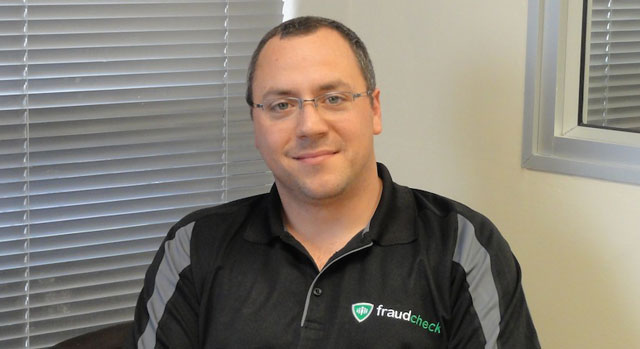
Fraudcheck, a new start-up based in the Cape Town suburb of Bellville, has been established to offer individuals and businesses peace of mind when dealing with people or companies they don’t know. The site is meant to help protect them from falling victim to fraudsters by offering vetting services that can check whether contact details, ID numbers and addresses supplied are genuine.
The company, which opened its doors last month, offers two services. The first is an identity check that confirms phone numbers and e-mail and physical addresses, cross-references these with the deeds office. An identity check costs R40.
The second option, which costs R120, provides an identity check as well as an in-depth review of an individual’s credit history and judgments or notices against them. It also allows users to examine a person’s debt review status, cross-check their last address and address history, and cross-check their personal details and mobile phone number.
In order to comply with privacy laws, Fraudcheck requires that those being vetted opt-in and the company doesn’t disclose sensitive information to either party but rather seeks to confirm that the details supplied to an individual or small business are, in fact, correct.
Fraudcheck MD John Laatz, 36, says the bulk of his team consists of risk management specialists. Laatz previously worked for an online UK risk management and payment services company called DataCash. He later started what is now Fraudcheck’s holding company, Progressive Dynamics.
Laatz says he opted for a “soft launch” for Fraudcheck and there have between about 250 sign-ups in the first month of operation. He says the company is targeting consumers and small businesses, from brokerages to insurance companies and small or medium-sized business.
“We’ve also attracted some interest from the investment space so, after our first round of funding, we will look to add services aimed at large companies,” Laatz says.
Until now, Fraudcheck has been wholly privately funded. Progressive Dynamics provides consulting services for UK companies but has seen its business declining because of the harsh economic conditions in that country. “We’ve been looking to get out of that market and launch own product in SA.”

The service was built and coded by a small, in-house development team.
Laatz created the start-up after noticing a lack of similar offerings in SA, and because of personal experiences. “We’ve all had instances where we’ve bought from Gumtree or other online classifieds and been nervous of the seller. We’re hoping Fraudcheck can bridge that gap and help separate the legitimate [sellers] from the chancers.”
Of the R40 or R120 users are charged for an inquiry, Laatz says Fraudcheck keeps about 20%. “We have three component costs,” he says. “The first is the cost of data suppliers, which is quite high. On smaller checks that can be up to 40% of the price, and on larger checks up to 60% of the fee can go on a full [credit bureau] report. Then there’s the cost of hardware, marketing, hosting and so on which accounts for another 10%.”
Although there is the option to pay for each check done, any user can register with Fraudcheck as a business and can get a volume discount of up to 25%. For now, those signing up also get one free check.
Laatz says Fraudcheck has spent an “enormous amount of time” on data privacy. The service uses an SMS opt-in process for vetting. “If you register and want to check someone, they’ll get an SMS asking for their ID number, which you’ll never see. Also, the person being checked gets offered the data we find. You won’t get their data, only the information they’re willing to give you and whether or not it’s valid.”
Much of Fraudcheck’s value lies in its rules management system, which isolates points of interest on the various reports it examines. “[Credit bureau] reports are long, laborious and detailed. We delve into every aspect and run about 120 rules against it. At the end of the findings are all weighted and packaged. You’ll get a red – proceed with caution, amber or green status, along with reasons.”
There’s also a dispute resolution process for those who don’t agree with the findings. Although the company can’t reverse judgments or alter credit history information, it can make people aware of these things so that they can follow up with retailers or banks about problems they might have.
When someone tries to register with an invalid ID or phone number, that information is stored so that future instances of the same numbers will show up immediately. — (c) 2012 NewsCentral Media

